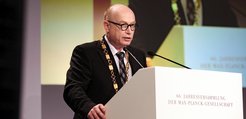Bundling excellence in Germany anew
Max Planck President calls for greater cooperation between outstanding scientists at universities and at the MPG
President Martin Stratmann proposed a new component for the German science landscape on Thursday at the Plenary Assembly held as part of the 66th Annual Meeting of the Max Planck Society. Based on an international comparative analysis of excellence and its geographical distribution in Germany, he called for Max Planck researchers to join forces with outstanding researchers at German universities in cross-regional education and research networks. President Stratmann views these theme-oriented schools as the key to increasing the international profile and attractiveness of German cutting-edge research.

Germany has an entirely different structural make-up to other countries that are highly developed scientifically. “We must build upon this structure if we wish to effectively strengthen cutting-edge research,” emphasized Martin Stratmann in his address to around 700 guests from the fields of science, politics and business in the Great Orangery at Charlottenburg Palace in Berlin. In contrast to the US, for example, “excellence in Germany is not concentrated at a small number of locations but is instead distributed nationwide,” said the President.
Evaluating the system based on publication success, he pointed out that there are 164 scientists conducting research in Germany who are among the top 1 percent of the most-cited researchers in their specialist field. In view of the size of its science system, Germany is therefore far less successful than the US (1,701), the UK (303), and even the much smaller Netherlands (76). Whereas half of these “excellent researchers” work at the universities, one-third of them are employed by the Max Planck Society, which consequently occupies first place as a research organization not just in Germany but also in Europe. The analysis also reveals that the three metropolitan areas of Munich, Berlin and Heidelberg account for most scientists in this category.
However, when the geographical distribution of the leading researchers is considered in terms of individual scientific fields, such as chemistry for example, a different pattern emerges: In contrast to the regional concentration of top researchers across all specialist disciplines, a nationwide distribution of excellence emerges. In comparison with the Anglo-American countries, no individual, geographically correlated centres predominate in Germany in many specialist fields. Stratmann is therefore convinced: “We will not fully harness the potential of excellent German science with predominantly local networks. If we want genuine clusters of the best minds which also attract attention internationally, then we must adopt a cross-regional approach.”
Cross-regional education and research networks as the key
The findings in the area of chemistry also apply to other disciplines. In order to productively bring together the existing, geographically distributed excellence in Germany and to cleverly bundle the individual profiles of the best German scientists, Stratmann suggests the set-up of cross-regional, theme-oriented Max Planck Schools. These could be based on the proven, locally organized International Max Planck Research Schools. “If leading scientists from the Max Planck Society team up with outstanding colleagues from the universities in seminal scientific fields, then education and research networks capable of competing with the top institutions in the world will arise,” emphasized Stratmann: “The best professors from all German universities could be integrated and would obtain an even higher profile internationally at these schools as high achievers in cutting-edge university research. The metropolitan centres of excellence would of course perform a special role as nodes in these networks.”
Stratmann also believes that promoting “excellence at the top” in a targeted way will create added value for the entire German science system: “Through these cross-regional networks we will create a feasible environment for successful new appointments from abroad - and not just for the Max Planck Society, but also for the universities that cooperate with us.”
Moreover, the Schools would “attract the best junior scientists from Germany and, above all, from abroad and hopefully also retain them in Germany.” One way to achieve this would be the establishment of tenure track paths within the Schools in order to be able to offer highly attractive positions for junior scientists in Germany above and beyond doctorate level. “This would enable us to achieve precisely what is required: new positions for junior scientists combined with a high standard of excellence,” highlighted Stratmann.
No watering down of the Excellence Initiative
Stratmann also voiced his support of systematically promoting outstanding research at the German universities in future with the continuation of the Excellence Initiative. “The German science system is currently enjoying a good period, not least due to the fact that government is focussing on strengthening science. However, Germany has not yet reached its goal in terms of cutting-edge research. The Excellence Initiative must therefore remain what its name implies – an initiative to improve the excellence of German science. Anything else should be carried out under a different name.”
JE
